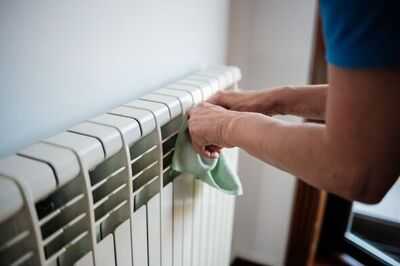
With colder weather fast approaching, households across the UK are being urged to clean their radiators by next Wednesday, October 1st, as many prepare to turn their heating back on for the first time since spring. As the nights grow longer and temperatures begin to dip, millions will soon be reaching for the thermostat but experts warn that now is the time to get your heating system ready for winter. The NHS recommends switching on the heating once indoor temperatures fall below 15C, and according to the Met Office, this temperature drop typically happens in October, although recent cold snaps have already seen parts of the UK dip below this threshold.
Before turning your heating on, however, it's important to clean your radiators properly, a simple step that can improve efficiency, reduce energy bills, and help keep your home warm and healthy. Dust build-up inside your radiators may seem harmless, but it can reduce their efficiency by as much as 30%, according to energy specialists.

That means you'll be using more energy and paying more to heat your home.
A study by Enertek International has also revealed that dirty radiators can increase energy bills by up to 25%.
To clean your radiator, first start by making sure it is turned off and completely cooled down if you have turned it on recently.
Next, BestHeating recommends using a vacuum cleaner with a nozzle attachment to remove dust from behind and between the panels.
If you don't have the right attachment, try wrapping a cloth around a long stick or ruler to reach those tricky spots.
For stubborn dust deep inside the radiator, you can also carefully use a hairdryer on a high setting to blow dust out. Place a towel underneath to catch falling debris.
Then, mix warm water with a mild detergent or washing-up liquid. Use a damp sponge or cloth to clean the radiator's surface, then dry it thoroughly with a clean towel to prevent rust.
Don't forget to wipe down the wall above the radiator. Heat can cause dust and dirt to stick there over time.
Avoid abrasive materials or harsh cleaners that could damage your radiator's finish. Never use bleach or antibacterial products as they can pose a significant fire risk and bleach can damage the metal surfaces of the radiator.
You may also like

Watch: Rahul Gandhi makes surprise visit to pizza place in Gurugram

Emma Bunton is 'ageing backwards' in flattering cherry-toned top that cinches her waist

'Bigg Boss 19' Contestant Farrhana Bhatt Gets Into Ugly Fight With Kunickaa, Asks Her To Lick Abhishek's Feet

'Disruptive' man 'dragged off' easyJet plane after pilot forced to land early

Jaguar Land Rover says some systems back online following cyber attack






